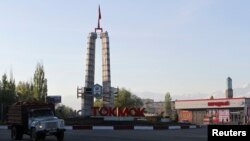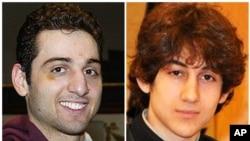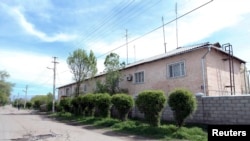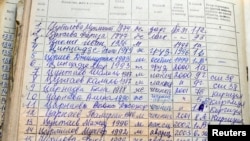TOKMOK, KYRGYZSTAN —
One trail in the search for clues about why two ethnic Chechen brothers may have carried out the Boston Marathon bombings leads to a sleepy town in Kyrgyzstan where
Tamerlan and Dzhokhar Tsarnaev are remembered as decent and obedient boys from their time in the 1990s in the small community of Chechens in Tokmok, a leafy town under the snow-capped Tien Shan mountains outside the capital Bishkek.
Tamerlan, the elder of the two, studied well. His father, Anzor, made a living selling used cars and was welcomed with open arms when he visited the town again two years ago, 10 years after the family left for Russia and then the United States.
The news that Tamerlan had been shot dead by police and Dzhokhar captured after a day-long manhunt on suspicion of carrying out Monday's bombing, in which three people were killed, was greeted with shock and disbelief.
"The Tsarnaevs were such a good family. They yearned to be well-educated. None of them were rowdy. It was a very cultured family," said former neighbor Raisa Kaayeva, a middle-aged housewife who is also an ethnic Chechen.
"I feel it with my heart - these boys were framed. Why did they go to this America? They should have stayed in Russia to lead a quiet life. Now they have been made scapegoats. I pity these boys. I was weeping when I saw it on TV - their lives were broken, as well as the lives of their mother and father."
Badrudi Tsokayev, a friend of the father, waved his hands repeatedly as he described his shock at hearing the news. Like others who recalled the family, he saw no signs of radicalism.
"I wouldn't imagine seeing this even in a nightmare," Tsokayev, 60, said on a quiet street in Tokmok, 60 km (38 miles) from Bishkek. "As a child, Tamerlan was such a quiet boy. Today everyone is calling me with just one question - is this true?"
He said Anzor Tsarnaev had been fiercely proud of Tamerlan's prowess in the boxing ring and said his son had been looking forward to going to the Russian city of Sochi to watch the 2014 Winter Olympics next February.
Chechen diaspora
It is in this town of 53,000 that the boys would have become aware of their Chechen roots. Dzhokhar, now 19, years later posted links to Islamic websites and others calling for Chechen independence on what appears to be his page on a Russian language social networking site.
They would have learned about the difficult fate suffered by their predecessors in Soviet times that has fostered a sense of injustice among some Chechens and helped fuel an independence drive in the Chechnya region of Russia's North Caucasus that led to two wars with Moscow in the 1990s.
Kyrgyzstan, a mainly Muslim nation of 5.5 million which hosts U.S. and Russian military air bases, had a huge influx of ethnic Chechens in 1944.
Hundreds of thousands of Chechens and ethnically close Ingush were evicted from their homes in the North Caucasus and moved to Central Asia in cattle wagons after being accused by dictator Josef Stalin of collaborating with Nazi Germany.
About 99,000 of the Chechens and Ingush ended up in what was then the Kyrgyz Soviet republic.
In Tokmok, the Tsarnaev clan alone inhabited a whole street before most of them moved back to their native village of Chiri-Yurt in Chechnya in the 1960s, residents said. About 20 Chechen families still live in a district popularly known as the Glass Factory, after the building that dominates it.
School registry
The brothers would have become more familiar with Islamist militancy when they moved in 2001 to Dagestan, the southern Russian province which lies at the heart of an Islamist insurgency and sees daily violence, and where their parents still live.
In Tokmok, they lived in a modest brick house before moving to a more spacious, two-story house opposite School No. 1 in the town center, where Tamerlan and his two sisters studied.
A school register shows Tamerlan's date of birth - Oct. 21, 1986 - and the date when he entered the fifth grade, Jan. 18, 1999. He studied here for a year.
Dzhokhar, born in 1993, was too young to go to school at the time.
"Yes, the Tsarnaevs studied here. I wouldn't say they were anti-social or anything like that. No, I can't say so," said school headmistress Lyubov Shulzhenko.
"The Chechen community here is so closely-knit and decent. We have never had problems with their children," said Natalia Ryabovol, a physics teacher.
In the Soviet era, Tokmok hosted a busy base which trained military pilots for pro-Soviet countries stretching from eastern Europe to Africa. A Soviet-made jet fighter is perched on a pedestal at the town's entrance.
Many of the townspeople today make a living by growing fruit and vegetables and tending cattle. The attack in Boston seems part of another world.
Kyrgyzstan, which borders China, is politically fragile after the toppling of two presidents since 2005. It says it cannot be held responsible for the brothers' actions.
"Taking into account the fact that the suspects left the republic when they were eight and 15 years old, the State Committee for National Security considers it inappropriate to link them to Kyrgyzstan," the Kyrgyz security service said.
Tamerlan and Dzhokhar Tsarnaev are remembered as decent and obedient boys from their time in the 1990s in the small community of Chechens in Tokmok, a leafy town under the snow-capped Tien Shan mountains outside the capital Bishkek.
Tamerlan, the elder of the two, studied well. His father, Anzor, made a living selling used cars and was welcomed with open arms when he visited the town again two years ago, 10 years after the family left for Russia and then the United States.
The news that Tamerlan had been shot dead by police and Dzhokhar captured after a day-long manhunt on suspicion of carrying out Monday's bombing, in which three people were killed, was greeted with shock and disbelief.
"The Tsarnaevs were such a good family. They yearned to be well-educated. None of them were rowdy. It was a very cultured family," said former neighbor Raisa Kaayeva, a middle-aged housewife who is also an ethnic Chechen.
"I feel it with my heart - these boys were framed. Why did they go to this America? They should have stayed in Russia to lead a quiet life. Now they have been made scapegoats. I pity these boys. I was weeping when I saw it on TV - their lives were broken, as well as the lives of their mother and father."
Badrudi Tsokayev, a friend of the father, waved his hands repeatedly as he described his shock at hearing the news. Like others who recalled the family, he saw no signs of radicalism.
"I wouldn't imagine seeing this even in a nightmare," Tsokayev, 60, said on a quiet street in Tokmok, 60 km (38 miles) from Bishkek. "As a child, Tamerlan was such a quiet boy. Today everyone is calling me with just one question - is this true?"
He said Anzor Tsarnaev had been fiercely proud of Tamerlan's prowess in the boxing ring and said his son had been looking forward to going to the Russian city of Sochi to watch the 2014 Winter Olympics next February.
Chechen diaspora
It is in this town of 53,000 that the boys would have become aware of their Chechen roots. Dzhokhar, now 19, years later posted links to Islamic websites and others calling for Chechen independence on what appears to be his page on a Russian language social networking site.
They would have learned about the difficult fate suffered by their predecessors in Soviet times that has fostered a sense of injustice among some Chechens and helped fuel an independence drive in the Chechnya region of Russia's North Caucasus that led to two wars with Moscow in the 1990s.
Kyrgyzstan, a mainly Muslim nation of 5.5 million which hosts U.S. and Russian military air bases, had a huge influx of ethnic Chechens in 1944.
Hundreds of thousands of Chechens and ethnically close Ingush were evicted from their homes in the North Caucasus and moved to Central Asia in cattle wagons after being accused by dictator Josef Stalin of collaborating with Nazi Germany.
About 99,000 of the Chechens and Ingush ended up in what was then the Kyrgyz Soviet republic.
In Tokmok, the Tsarnaev clan alone inhabited a whole street before most of them moved back to their native village of Chiri-Yurt in Chechnya in the 1960s, residents said. About 20 Chechen families still live in a district popularly known as the Glass Factory, after the building that dominates it.
School registry
The brothers would have become more familiar with Islamist militancy when they moved in 2001 to Dagestan, the southern Russian province which lies at the heart of an Islamist insurgency and sees daily violence, and where their parents still live.
In Tokmok, they lived in a modest brick house before moving to a more spacious, two-story house opposite School No. 1 in the town center, where Tamerlan and his two sisters studied.
A school register shows Tamerlan's date of birth - Oct. 21, 1986 - and the date when he entered the fifth grade, Jan. 18, 1999. He studied here for a year.
Dzhokhar, born in 1993, was too young to go to school at the time.
"Yes, the Tsarnaevs studied here. I wouldn't say they were anti-social or anything like that. No, I can't say so," said school headmistress Lyubov Shulzhenko.
"The Chechen community here is so closely-knit and decent. We have never had problems with their children," said Natalia Ryabovol, a physics teacher.
In the Soviet era, Tokmok hosted a busy base which trained military pilots for pro-Soviet countries stretching from eastern Europe to Africa. A Soviet-made jet fighter is perched on a pedestal at the town's entrance.
Many of the townspeople today make a living by growing fruit and vegetables and tending cattle. The attack in Boston seems part of another world.
Kyrgyzstan, which borders China, is politically fragile after the toppling of two presidents since 2005. It says it cannot be held responsible for the brothers' actions.
"Taking into account the fact that the suspects left the republic when they were eight and 15 years old, the State Committee for National Security considers it inappropriate to link them to Kyrgyzstan," the Kyrgyz security service said.








